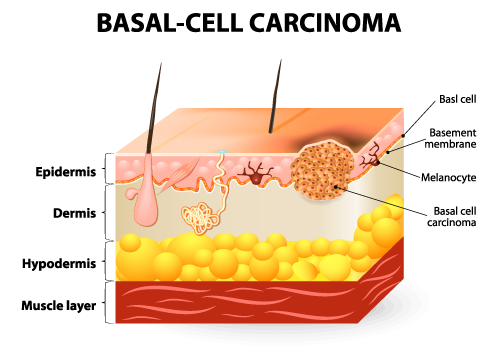 Basal cell carcinoma (BCC) is the most common form of cancer, with about a million new cases estimated in the U.S. each year. It is estimated that 1 in 3 adults will develop a basal cell carcinoma in their lifetime. Basal cells line the deepest layer of the epidermis. Basal cell carcinomas are malignant growths–tumors–that arise in this layer.
Basal cell carcinoma (BCC) is the most common form of cancer, with about a million new cases estimated in the U.S. each year. It is estimated that 1 in 3 adults will develop a basal cell carcinoma in their lifetime. Basal cells line the deepest layer of the epidermis. Basal cell carcinomas are malignant growths–tumors–that arise in this layer.
Basal cell carcinoma can usually be diagnosed with a simple in office biopsy and is fairly easy to treat when detected early. Treatment options include electrodessication and currettage (simply creating a man made “brush burn”), excision, Mohs micrographic surgery, and radiation. Treatment choice depends on the type of basal cell carcinoma, location, size, and age of the patient.
Five to ten percent of BCCs may be resistant to treatment or locally aggressive, damaging the skin around them, and sometimes invading bone and cartilage. If a basal cell carcinoma is not treated, they grow larger with time and can become difficult to eliminate. Fortunately, however, this is a cancer that has an extremely low rate of metastasis, and although it can result in scars and disfigurement, it is not usually life threatening.